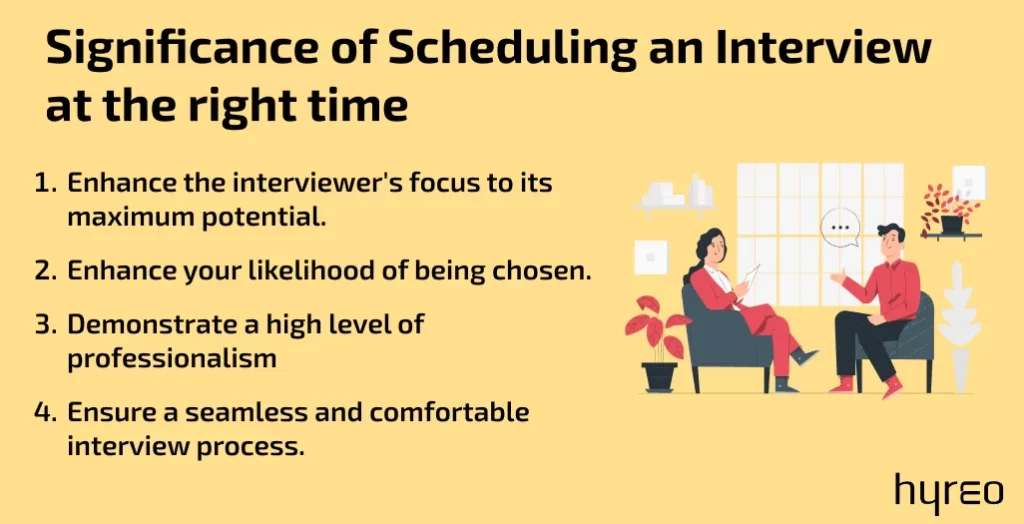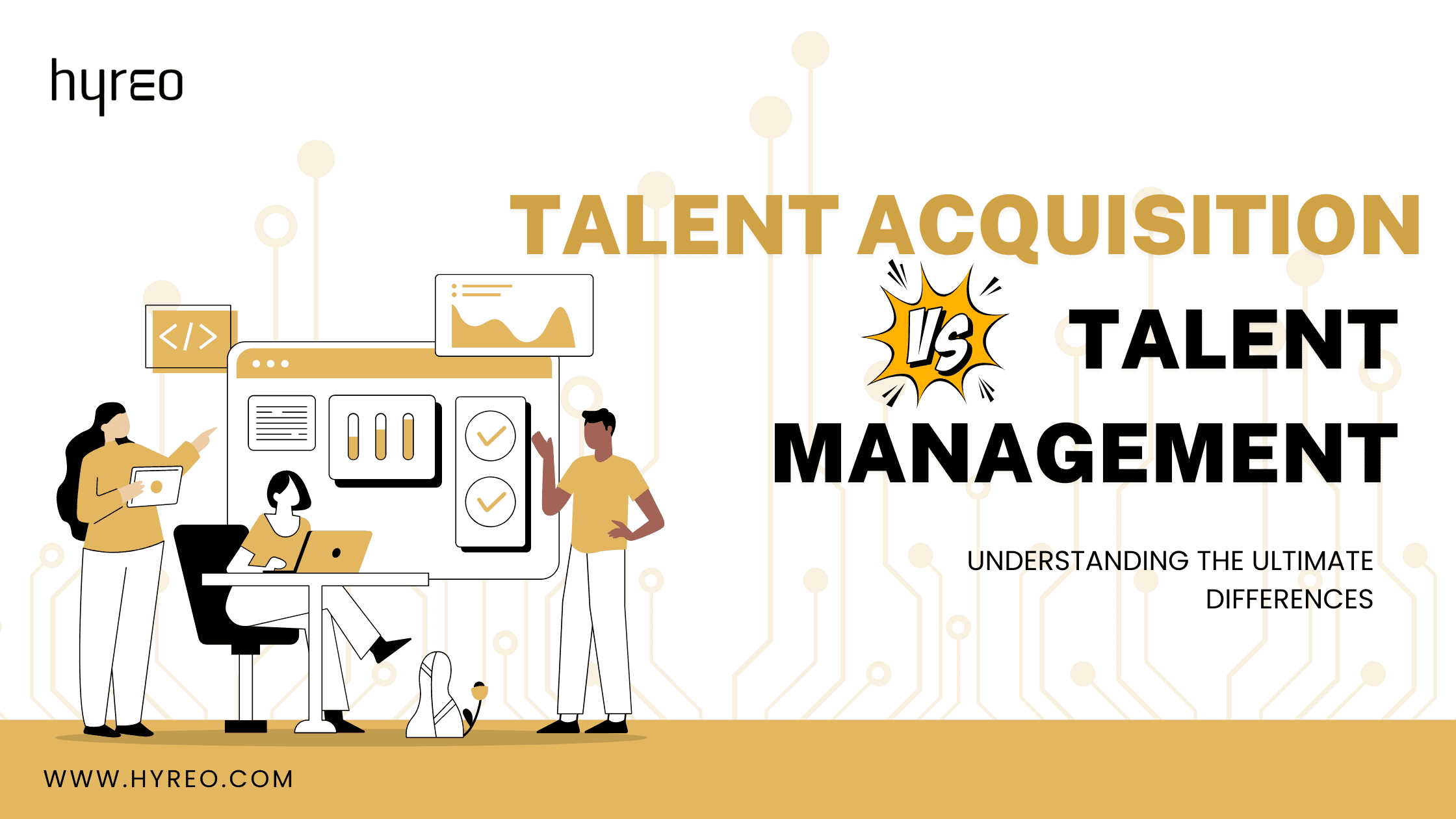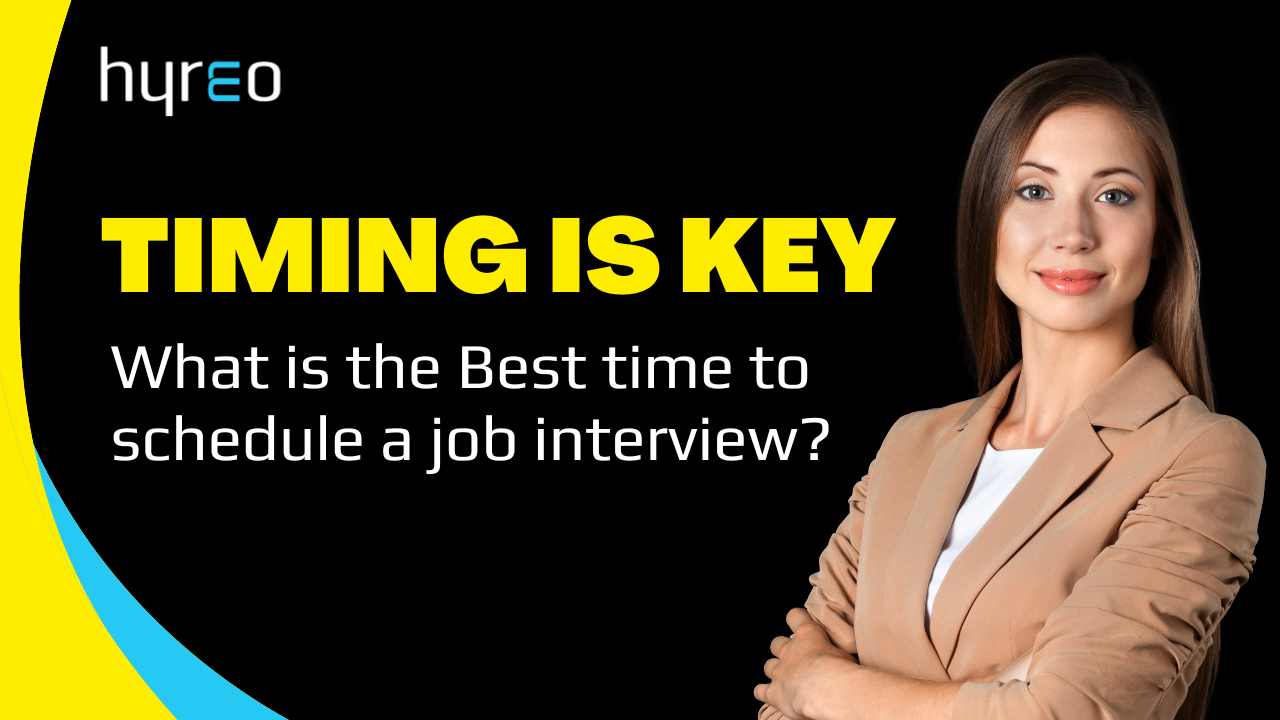Key takeaways:
1. Scheduling an interview at the right time can have a significant impact on your chances of success
2. Factors to consider when choosing an interview time include the interviewer’s availability, type of job, personal schedule, time of day, travel time, and personal aspects
3. Avoid scheduling an interview too early in the morning, during lunchtime, late in the day, or on a Friday afternoon
4. Being respectful of the interviewer’s time and scheduling the interview during their most alert and concentrated period can maximize your chances of leaving a good impression
5. Personal aspects such as mental health and work-life balance should also be taken into account when scheduling an interview
“Focus on every single step, it will pave your way to your destination”- In an interview process, the first step is to schedule an interview slot. When you get an interview letter, it’s important to make a positive meeting strategy. If you believe that your skills alone would make a difference, think again.
In a two-way conversation like an interview, the interviewer should be ready to analyze your skills. So, it’s important to make sure that the interview is scheduled at a time favorable for you.
Several little details that improve the process efficiency must also be considered in addition to time. According to Queen’s University Belfast (QUB), 65% of employers believe clothes can be the deciding factor between two similar candidates.
If you’re looking for the best tips to schedule the interview optimistically, here you go…

What is the significance of scheduling an interview at the right time?
The right time comes when you are fully prepared, but in addition to preparation, there are other aspects to take into account to improve your chances of success in the interview.
Let’s look into some of the impacts that are shaped by setting the interview at the right time
#1 Maximize the interviewer’s concentration
By scheduling the interview during their most alert and concentrated period. This will boost your chances of leaving a good impression. For instance, it could be preferable to schedule an interview in the morning rather than the afternoon when the interviewer might be more weary or preoccupied.
#2 Improve chances of selection
Arranging an interview at a time that clashes with the interviewer’s schedule might lead to issues and possibly distract them during the interview. Your chances of getting the job might be increased by making sure the interviewer has adequate time to concentrate on the interview.
#3 Display professionalism
Being on time and being considerate of the interviewer’s time demonstrates your professionalism and respect, which may help you establish a good first impression.
#4 Smooth interview experience
A convenient interview schedule can help reduce interview stress for both parties.
Excited to choose the time for your interview?!
It’s not the time that astrology tells you, it’s the time that fits right based on the industry standards and of course, takes your preference as the priority!
Let’s check out some factors to consider when choosing the right interview time…
What factors to consider when choosing an interview time?
#1 Interviewer availability and timetable
It’s essential to show respect for the interviewer’s availability and schedule. Find their availability and make an effort to schedule the interview during one of those times.
#2 Type of job
The optimal time to arrange the interview may vary depending on the sort of job you are applying for. For instance, arranging the interview in the morning may be a smart option if you are applying for a job that needs working early in the morning to demonstrate your dependability and punctuality.
#3 The timetable
Make careful to take into account any other commitments or activities you have during the day since you want to pick a time that works for you.
#4 The time of day
When arranging your interview, you should also take this into account. While some people may do better later in the day, others may be more awake and focused in the morning. Choose a time that is convenient for both you and the interviewer.
#5 Commute time
When picking a time that you need to go to the interview site, you shouldn’t be hurried or late.
#6 Personal aspects – yes, important
Lastly, think about any aspects of your personal life that could impact how well you do in the interview. A morning interview may not be the greatest choice, for instance, if you are not a morning person. You want to pick a moment when you can be at your best and project the finest image of yourself.
You can find it difficult to focus for long enough to do something due to poor mental health or even just stress. It’s better to find a balance between work life and personal life and it’s very important to give attention to personal stuff for mental goodness.
Times of day to avoid a job interview?
If you have understood the perfect time to schedule the interview, then you should also be able to know the timings to avoid. This way, it will benefit your brain to hold on to ‘what not to do’ rather than ‘what to do’.
General guidelines to choose the right time for the interview:
#1 Early in the morning
If you’re not a morning person, arranging an interview too early might not be your greatest choice. Yet, some people are more attentive and able to concentrate in the morning. If you have problems waking up early, you run the danger of not having adequate time to prepare and be your best.
#2 Lunchtime
Arranging an appointment during lunch may not be the ideal choice because it could conflict with the interviewer’s break or they might not be as focused after eating.
#3 Late in the day
Having an interview scheduled in the late afternoon may not be the ideal decision because the interviewer could be drained or disoriented from a long day at the office. Sometimes, this makes the interviewer not understand your skills properly, leading to the rejection of your application.
#4 Friday afternoon
Every employee will be ready when Friday hits since it’s just too close to celebrating the weekend!
Booking an interview on a Friday afternoon might not be the ideal choice since the interviewer might be more preoccupied with finishing up the week’s work and may not pay as close attention to you as is necessary to evaluate you for the role.
#5 Rush hour
If you have to drive to the interview site, scheduling an interview during rush hour might add additional tension and worry. Also, you can be late for the interview due to traffic or transit issues. Please do not rush, when it comes to having your (soft) skills evaluated!
In general, it’s advisable to steer clear of arranging an interview at times that might lead to unnecessary stress, distraction, or difficulty for both you and the interviewer.
Okay, since we just scrolled on to when not to do, now let’s dive into knowing when to do it.
The ideal time for a job interview?
Here are some suggestions to keep in mind while picking the best time for the interview.
#1 Mid-morning
According to many hiring managers, a job interview is best conducted in the morning, at approximately 10 or 11 a.m. A study by the National Academy of Science shows that 1,100 judges said that they were more inclined to grant requests for parole in the morning.
#2 Early afternoon
Arranging an interview for the early afternoon, between 1 and 2 p.m. is also a smart idea. When it is after lunch, the interviewer is less likely to be preoccupied with thoughts of hunger or their upcoming meal.
#3 Mid-week
Tuesday mornings would be an ideal time for job interviews. If you have the choice, scheduling your interview around the middle of the week is probably the best option because everyone despises Mondays and isn’t ready on Fridays. Tuesday, Wednesday, or Thursday are good choices for the middle of the week when scheduling an interview.
#4 Avoid busy periods
You should steer clear of arranging an interview at times that are particularly busy during the day or week, such as rush hour, lunchtime, or on a Monday or a Friday. This is because the interviewer could be more preoccupied with other responsibilities or finishing up the week’s work.
Conclusion
Overall, scheduling an interview may seem easy but it’s very important to give attention to every single factor, taking care of small things leads us to big changes. Even though you are ready and well prepared to challenge the interview, your surroundings and circumstances should be favorable for you and that’s where your decision-making skills play a vital role.
Recommended Reads:
Best Interview Scheduling Softwares
Behavioural questions for interviews
https://hyreo.com/tips-to-prepare-successful-job-interview/
FAQs on Best Time for Scheduling Job Interviews
Should I take the interview slot first or last?
Being first gains all concentration, and sometimes it would be very difficult for the first candidate. Conversely, if the last contender lost all focus, it wouldn’t work. Being in the center is therefore the safer course to take.
What is the best time slot for a job interview?
Tuesday between 10 a.m. to 11 a.m. can be the ideal time slot for a job interview. It is a time slot which stands in the middle, which is always a safer go.
Is it normal to have an interview in the evening?
Booking a slot in the morning or evening, the response from the interviewer may vary according to the time but when you’re at your best to impress the interviewer, you need not wait for the right time.
How late is too late for an interview?
Being late to the interview definitely creates a bad impression. That said, if you haven’t missed your interview then you are not too late. Delays notwithstanding, if you had a valid reason, you should provide a sincere explanation for the delay with genuine apologies for the inconvenience caused to all those involved in the interview.
Do interviews happen in the evening?
If the recruiter is willing to have the interview in the evening and if it is convenient for the interviewer and the candidate then it is normal.














